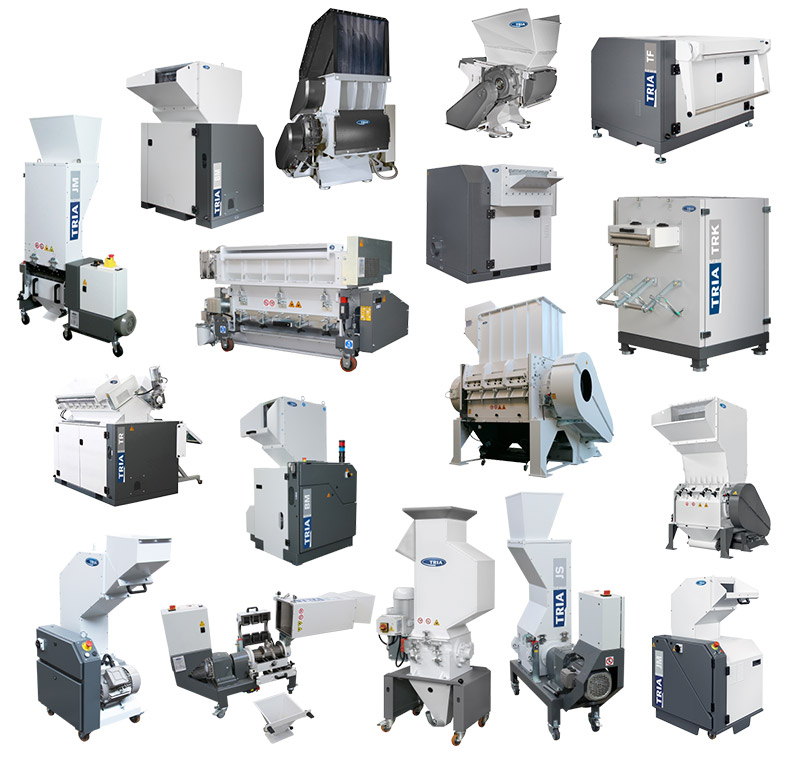Plastics grinders
The portfolio of the Italian company TRIA includes plastics grinders for various purposes – foils, large plastic parts, panel elements, monofilaments; grinders for thermoformed, extruded plastic materials and extrusion remnants.
The company’s goal is to develop grinders of superior design, highly efficient and fully automated systems. All grinders are made of reinforced materials. They generate minimum noise and are easy to maintain. TRIA has an annual production of over 1000 grinding units, 80 % of which are exported.
About TRIA (PDF 7.02 MB)
Important milestones
- In 1954, in Milan, Angelo Anceschi designed and produced the first TRIA plastics grinder with rotational blades
- In the late 1980’s, the third generation of the Anceschies joined the company. The three sons – Luciano, Marco and Claudio, brought in new ideas and technologies and modernized the company’s structure
- At the beginning of the 90’s, a new technological partnership with German and Japanese companies began
- 1998 – a subsidiary opened in Germany – TRIA Germany, Düsseldorf
- 2000 – a subsidiary opened in Brazil – TRIA Brazil, near San Paolo (production started in 2003)
- 2004 – the 50th anniversary of the company
- 2010 – a subsidiary opened in the USA – TRIA America, headquartered in Charlotte, North Carolina
- 2011 – a subsidiary opened in China – TRIA China, Shanghai
Categories
Injection Molding
Blow Molding
Extrusion
Film
Thermoforming
SHREDDERS
Neofyton – TRIA’s partner and representative
Neofyton is TRIA’s partner and representative for the markets of Serbia, Bosnia and Herzegovina, Macedonia, Nigeria and Cameroon.
Ever since 1954, Tria has been specializing in the production of granulators for grinding plastics, with rotational knives. Grinding of plastic pieces can be organized in line (rejects are discharged and ground during production process) or in a centralized way (entire waste is collected in one place and transported to granulators with aspirators).
Neofyton youtube chanel
Business lines
Automotive
medical
packaging
technical molding
teletronics
ENERGY EFFICIENCY
Energy efficiency is a concept that in our part of the world became important towards the end of 2008 and the beginning of 2009, at the outset of the world economic crisis. Most business people had, until then, mostly declaratively considered power consumption as a significant element of the total cost analysis. In these considerations, the impact of energy efficiency on the environment pollution had hardly been tackled at all.
Neofyton was among the first companies in Serbia and the region to start actively demonstrating the importance of energy efficiency, both by cutting production costs and therefore increasing profit rates and building awareness of the resource shortage and broader ecological principles.
Energy savings through the use of Neofyton's machines
In comparison with our direct competitors in the field of plastics injection machines, and with the utilization of standard hydraulics with integrated so-called "smart" pumps, our machines consume as much as 50% less energy. The use of servo-hydraulics opens up the potential of savings as high as 70%. We have a very precise power consumption measuring device to prove this.
The company Engel was the first plastics injection machine manufacturer back in 2009, which introduced the power consumption page as a standard component of the control assembly – "Ecograph", where - next to the weight of each product (molded part) in every cycle - total hourly consumption is shown, as well as the specific power consumption per one kilogram of processed plastics (kWh/kg).
ENVIRONMENTAL PROTECTION
The equipment we represent contributes to ENVIRONMENT PROTECTION in several ways.
When it comes to ancillary equipment, above all water chillers by our supplier Eurochille, used for temperature control of both hydraulics and machine servo motors and molds (tools) in which finished products are made, the chiller systems we sell facilitate the use of a new cooling system based on the so-called "adiabatic effect".
In summer, the hydraulics and servo motors of the injection molding machines call for cooling with water at a maximum of 28°C. Using the so-called "free cooling" device with the "adiabatic effect", cooling of process water is performed without cooling compressors (which use freon as the heat exchanger). Heat exchange, i.e. cooling happens exclusively by the use of ventilators, which translates into six- to eightfold savings compared to traditional chillers that use freon-based compressors.
One of our customers has reduced the required cooling energy by 1.400.000 kWh per year, i.e. by about 70.000 EUR, using the "adiabatic" cooling devices. An additional benefit is the elimination of major pollution risks which might arise from emissions of freon into the atmosphere due to tube puncture or breakage.
A similar calculation can be applied to our Engel injection molding machines, as well as to the Piovan granulate dryers.
The TRIA granulator – BM version, for auto parts recycling
The quality of ground material is high, as dust and other impurities content is significantly lower, the ground material is homogenous and has consistent quality. In addition, the granulator is energy efficient.
Neofyton youtube chanel
Leader in production
TRIA is a leader in the production of grinders and grinding systems and holder of the Quality Assurance System – ISO 9001.
The Tria machines are easy to use and maintain, reliable throughout their life span and quick to return the investment.















